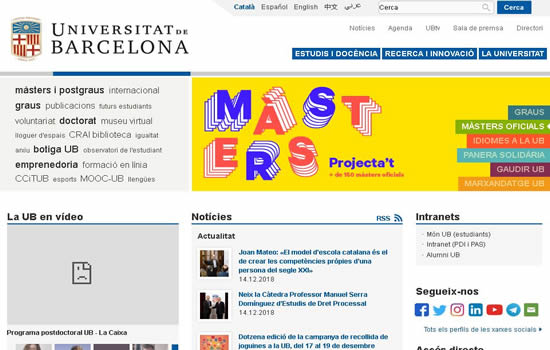选择热点
 荷兰莱顿大学
荷兰莱顿大学 西班牙巴塞罗那大学
西班牙巴塞罗那大学 巴西圣保罗大学 University of Sao Paulo, Brazil
巴西圣保罗大学 University of Sao Paulo, Brazil 台湾南华大学 University of South China in Taiwan
台湾南华大学 University of South China in Taiwan 科技大学 National University of Defense Technology
科技大学 National University of Defense Technology 南京大学 Nanjing University
南京大学 Nanjing University 上海复旦大学 Fudan University
上海复旦大学 Fudan University 泗水大学(Ubaya)
泗水大学(Ubaya) 印尼大学 universitas indonesia
印尼大学 universitas indonesia 越南某大学 Vietnam National University
越南某大学 Vietnam National University 菲律宾大学 University Of The Philippines
菲律宾大学 University Of The Philippines
遗传学之父(Father of Genetics)
发布时间:2025-01-06
来源:大学网站
讲到遗传学,我们不能不提孟德尔。
他的研究奠定了遗传学和现代生命科学的基础。
1900年以后,世人才公认他对遗传学的贡献。
据说他在1865年宣读论文的时候,台下的听众没几个人听得懂他在讲什么。
His name is introduced to biology students, but often forgotten after the final exam.
His pioneering discoveries went unnoticed by the world until years after his death.
But now, in the era of genetic engineering and cloning debates, scientists are elevating Johann Gregor Mendel to his rightful place in history alongside better-known, 19th century contemporaries such as Charles Darwin.
Experts and scientists have collected artwork and artifacts inside the partially restored Abbey of St.
Thomas in Brno, a Czech city where Mendel lived, experimented with pea plants and published his historic findings in 1866, becoming the "father of genetics.
" The abbey, which dates from the 14th century, was seized from the Augustinian monks by communists in 1950 and returned to the religious order after the Velvet Revolution in 1989.
A restoration project began in 1996.
Yet much of the stone complex remains unused.
Mendel was born to a farming family in what's today the eastern Czech Republic.
He became a priest in 1847 and later studied science at the University of Vienna.
Fascinated by plant hybridization, he began experimenting in the abbey garden with pea plants.
During the 1850s Mendel carefully and systematically crossbred the plants until reaching conclusions that form the basis for the laws of heredity.
He presented his landmark paper in 1865 and had it published the next year.
But no one noticed.
According to scholars, Mendel's contemporaries failed to grasp the significance of his discoveries.
But around 1900 -- long after his death in 1884 -- a British zoologist re-introduced the Czech scientist and his work, sparking an era of medical, agricultural and scientific progress that continues today.
Indeed, thanks to Mendel and his peas, modern man understands why children inherit their parents' traits, what roles are played by chromosomes and DNA in living things and how genetics can be used to improve human health.
More recently his findings led to the famous cloning of Dolly the sheep, as well as ethical debates over human cloning and farming with genetically modified crops.
【遗传学之父(Father of Genetics)查看网站:[db:时间]】
他的研究奠定了遗传学和现代生命科学的基础。
1900年以后,世人才公认他对遗传学的贡献。
据说他在1865年宣读论文的时候,台下的听众没几个人听得懂他在讲什么。
His name is introduced to biology students, but often forgotten after the final exam.
His pioneering discoveries went unnoticed by the world until years after his death.
But now, in the era of genetic engineering and cloning debates, scientists are elevating Johann Gregor Mendel to his rightful place in history alongside better-known, 19th century contemporaries such as Charles Darwin.
Experts and scientists have collected artwork and artifacts inside the partially restored Abbey of St.
Thomas in Brno, a Czech city where Mendel lived, experimented with pea plants and published his historic findings in 1866, becoming the "father of genetics.
" The abbey, which dates from the 14th century, was seized from the Augustinian monks by communists in 1950 and returned to the religious order after the Velvet Revolution in 1989.
A restoration project began in 1996.
Yet much of the stone complex remains unused.
Mendel was born to a farming family in what's today the eastern Czech Republic.
He became a priest in 1847 and later studied science at the University of Vienna.
Fascinated by plant hybridization, he began experimenting in the abbey garden with pea plants.
During the 1850s Mendel carefully and systematically crossbred the plants until reaching conclusions that form the basis for the laws of heredity.
He presented his landmark paper in 1865 and had it published the next year.
But no one noticed.
According to scholars, Mendel's contemporaries failed to grasp the significance of his discoveries.
But around 1900 -- long after his death in 1884 -- a British zoologist re-introduced the Czech scientist and his work, sparking an era of medical, agricultural and scientific progress that continues today.
Indeed, thanks to Mendel and his peas, modern man understands why children inherit their parents' traits, what roles are played by chromosomes and DNA in living things and how genetics can be used to improve human health.
More recently his findings led to the famous cloning of Dolly the sheep, as well as ethical debates over human cloning and farming with genetically modified crops.
【遗传学之父(Father of Genetics)查看网站:[db:时间]】
- 上一篇: 塞翁失马(We'll See)
- 下一篇: 坚定(Determination)
相关阅读
目录列表
资讯列表
英语资讯


共0条评论
网友评论温馨提示:您的评论需要经过审核才能显示,请文明发言!